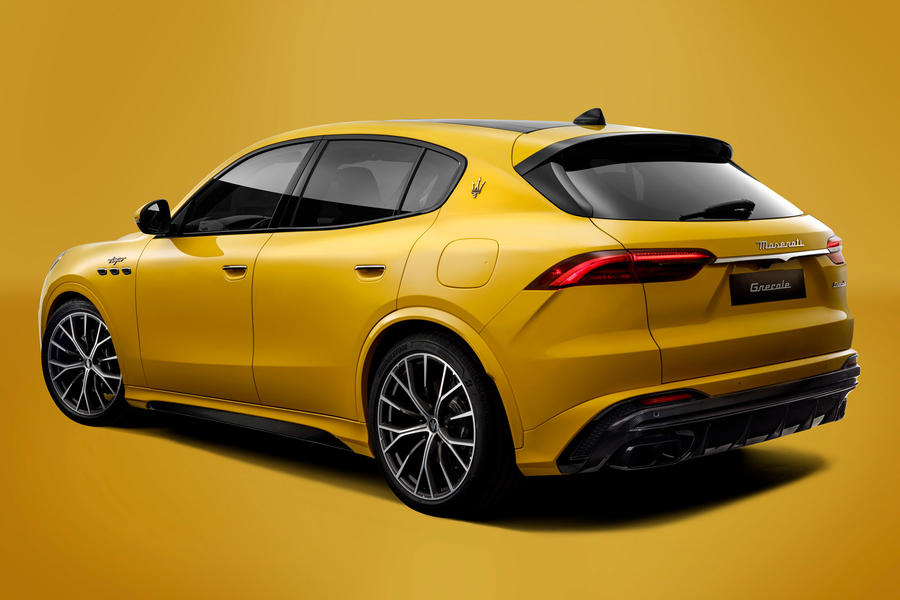Maserati’s second SUV arrives with a pair of punchy V6 engines and a mild hybrid; pure EV coming in 2023
Maserati’s most strategically important and potentially best-selling model in decades is the new Grecale SUV, which provides the Italian firm with a long-awaited rival to the Porsche Macan and will play a fundamental role in its rapid transition to electrification.
Revealed shortly after Maserati’s parent company Stellantis announced that the brand – along with Alfa Romeo, DS and Lancia – will launch only electric cars from 2025, the Grecale has been engineered to accommodate pure-combustion, hybrid and fully electric drivetrains (see below), which will lend it a similar flexibility of purpose to its German rival, itself due a pure-EV in 2023.
It sits below the Levante in the Maserati line-up, and will be joined in dealerships by the long-awaited second-generation Gran Turismo sports car – which will also be offered with an electric drivetrain, as well as the all-new versions of the Quattroporte and Levante due in the coming years, each with a full spread of drivetrain options.
Powertrains
It will be available from launch with three petrol engine options: two variants of the 3.0-litre ‘Nettuno’ V6 first used by the MC20 supercar for the mid-rung Modena and top-spec Trofeo, and a four-cylinder mild hybrid for the entry-level Grecale GT.
The V6 uses the same pre-chamber combustion technology as the full-fat MC20 engine, which aims to boost both performance and efficiency, but has been modified in line with its more mainstream billing. It has a wet rather than dry oil sump, for example, and can deactivate the right cylinder bank at a cruise for reduced consumption – this function necessitated a ‘complete redesign’ in order to accommodate collapsible tappets which allow the valvetrain on that side of the engine to be deactivated independently.
In the Modena, the V6 is tuned to give 325bhp and 332lb ft for a 0-62mph time of 5.3sec, while the Trofeo bumps those figures up to 523bhp and 457lb ft to shave the sprint time to just 3.8sec – quicker than the BMW X3 M Competition.

The mild hybrid car, meanwhile, takes 296bhp and 332lb ft from a twin-turbocharged 2.0-litre unit mated to a belt-integrated starter-generator (BiSG) and a 48V battery in the boot to give improved economy and an electrical power boost under hard acceleration. Maserati claims a 0-62mph time of 5.6sec, 30.7-32.5mpg on the WLTP combined cycle and – crucially – an engine note “that retains the usual characteristics of any other Trident-brand car”.
All engines send their reserves through an eight-speed ZF automatic gearbox to both axles, with a self-locking limited-slip differential fitted to the rear of the Modena and Trofeo, and optional on the GT.
Chassis
The Grecale measures 4846mm long by 1670mm tall and 2163mm wide, with a wheelbase of 2901mm, which makes it a similar size to Alfa Romeo’s similarly conceived Stelvio SUV – no coincidence, given it fundamentally shares that car’s acclaimed Giorgio underpinnings.
Optional air suspension gives six levels of adjustment over a 65mm height range – sitting lowest in park mode and at full height in Off-road – and a new vehicle dynamic control module (VDCM) serves as “a top-ranking orchestral conductor” for all dynamic elements of the chassis. Maserati says this system’s predictive intervention into suspension movements differs according to the drive mode selected (Comfort, GT, Sport, Race or Off-road) and gives “levels of performance and integration that could not have been achieved in the older architecture”.
Ventilated brake discs with four-piston callipers are standard but higher-spec cars get dual-cast perforated items paired with performance six-piston callipers at the front and four-pots at the rear.

Styling
Design-wise, the Grecale gives strong clues as to what to expect from other models Maserati’s new-era line-up; its silhouette is a close match for the larger Levante, but the influence of the new MC20 is evident in its “low and imposing grille” and its silhouette, which “takes on a vertical rather than a horizontal aspect”.
The rear end, meanwhile, is characterised by new boomerang-shaped headlight designs claimed to be inspired by the Giugiaro-designed 3200 GT sports coupé from 1998 and a new-look exhaust, while the performance-minded Modena and Trofeo variants are marked out by a rear track widened by 34mm over the standard Grecale GT – as well as bespoke bumpers and chrome detailing on the front grille.
Interior
The cabin represents a radical departure from existing Maserati models, chiefly in the adoption of a new four-screen set-up which brings enhanced digital functionality and allows for a more minimalist, switchgear-light design.
The driver display is digital as standard and there’s a 12.3in central infotainment screen, a 8.8in touchpad for the climate control and a new digital clock mounted prominently at the top of the dashboard. The removal of the bulk of physical controls, as a result, allows for a larger central armrest and a dedicated phone charging cubby.
Materials and colour schemes differ according to trim level; the GT adopts a more minimalist look and warm colours, while the Modena features bespoke embroidery, trim elements and stitching, and the Trofeo is market out by its exposed carbonfibre panels, perforated leather seats and contrasting stitching.

Source: Autocar
